#fully expecting it to be established not in real time in like a prequel or something similar
Explore tagged Tumblr posts
Text
you know the content drought is bad when you think about content from over a year ago and still get excited
#this is about gregorys voicelines in ruin#i cannot express to u all how hype his trailer lines were to me#it was insane#especially bc back then before ruin i was fully under the impression both gregory and vanessa would be returning in ruin#which wasnt even a crazy assumption like. they were the only characters in the story besides the animatronics#but alas here we are#im still hype as fuck tho for when they come back for real#its in the horizon i can feel it#i truly have so much hope because of secret of the mimic#its marking the end of the mimic being integrated and the beginning of it just being IN the story already#and the story now being able to progress instead of only introductions#hype as fuck#especially as someone whos a gregory fan and knows for sure he'll come back#at the very least just for cassies elevator plotline#but i really think he'll be allowed to have more going on than just what relates to cassie#theres ggy after all and we all know they know about that shit#those references are a giant red blinking arrow towards screentime#but i also dont think thatll be all hes going to have going on from now on either#fully expecting it to be established not in real time in like a prequel or something similar#at least referenced from the past#then when hes doing shit in real time in the present its just gregory#pandas.txt#pandas talks
8 notes
·
View notes
Text
fr tho one of my favorite things about Yuri is his timeline starting at the novel, through to First Strike and its prequel drama CD, through to the game, and the progression of him as a character that is fully fleshed out through all of them. I don't know that it was all entirely intentional and that it was all planned out exactly like this, but I find Yuri's progression as a character to be absolutely fascinating when combining all the media.
(there are spoilers below for the novel)
at seven, he's too mature for his age. he's already taking care of the other kids and trying to keep them safe. by ten, he's already literally basically being told to help actually raise the younger kids.
by his teenage years he's gotten more silly, almost as if in response to raising a bunch of now younger than his age group kids. keeping things lighthearted for them. he's also at a point where he's all around more open, happier, and his best self.
when everything starts crashing down and he starts losing a bunch of people he loved, he gets jaded so fucking fast.
when Jareth starts showing off materialistic things, Yuri immediately feels worried. he knows he has no place to decide what makes Jareth happy and has no place to tell him how to spend his hard earned money. he's just... worried to see how different he's acting because he was never like that.
when the town starts getting attacked, he has to be a leader because he's one of the only people who knows how to handle a real weapon and how to fight. not only that, but he's only a teenager and is becoming familiar with actual, real violence now. he does his best to keep his spirits up, but you can tell it's weighing on him. he's starting to assume the worst and expect more violence. he anticipates bad things and is always anxious. he literally mentally beats himself up because he didn't have faith that Flynn would be able to get them help. he feels horrible for not believing in Flynn and literally feels like he betrayed Flynn simply for not believing in him. for almost choosing violence in response to violence, while Flynn was trying to handle it legally.
then everything starts happening in this massive slippery slope. Jareth is murdered, and Yuri has to see this boy he grew up who he was just worrying about not too long ago bleed out and die in front of him. residents are killed by the poison, including a child he'd been helping raise. he was horrified at everything happening. things were finally better for the Lower Quarter and he was truly, sincerely happy, but now everything was a mess. Jiri dies a month later and he realizes he's just lost the person who was basically his mother.
then Flynn leaves. it's not specified exactly when, but he's not around as much anymore and First Strike mentions he "left", so moved out. so Flynn, having come from the Citizen's Quarter, now moved back there after all this trauma that happened in the Lower Quarter. but the thing is, Yuri's now lost the person who was at his side endlessly. they lived together and were the last of the teenagers living in the communal home. Yuri was always thinking about Flynn. and now, after a handful of residents died and two of his most precious family members, Flynn has left him too, even if not in death. his best support, just gone.
if you count the First Strike drama CD, Yuri has already gotten to a point, between the time when all this chaos happened and before joining the knights, that's he been getting into fights often enough that Hanks expects it now. on his end, Hanks has basically watched his foster son spiral into this misbehaving teen, almost adult prior to this (as by this point he's already well established as a problem child).
Yuri was always a mature and intelligent kid. he was someone the Lower Quarter relied on as a teen, and someone the rest of the kids relied on as a child. now he's basically the guy everyone in the Lower Quarter expects to cause trouble/get into trouble. Hanks has lost his family, but he's also had to watch what's left of it spiral into this. like... to me this is Yuri coping, or failing to properly cope, with everything that's happened if you take it from a media timeline standpoint.
since a game writer wrote the novel, naturally he kept the game in mind while writing it (and it shows a lot, since there are a lot of nods to it). also, the FS drama CD came out in 2010, which means it was made before the novel. I doubt he kept that in mind while writing the novel, but I do think the events of the novel actually fit in perfectly with Yuri's behavior in the drama CD.
at this point, Yuri wants to prove himself to Hanks that he can be a knight. Hanks doesn't believe it. of course he doesn't! he's seen the shit Yuri's started doing! but Yuri wants to protect the town, and he wants to prove himself. he's aware he's a mess and has nothing going for him.
then when Yuri reunites with Flynn in the knights, Flynn has changed a lot, but so has Yuri. at first things seem okay and they get along fine, but it starts going down a slippery slope fast. they butt heads and aren't the same guys they were as teenagers. inseparable. attached at the hip. supporting each other constantly. Yuri has found the one person left from his past who is still in his life besides Hanks (who never left, meaning Yuri has reunited with a person who disappeared, essentially). by the end of the drama CD, they're not really on the greatest terms, but they're... okay while they look after Repede, who wasn't feeling well.
and then you get to First Strike, where they're still having trouble communicating. Flynn is uncompromising, and Yuri has stopped really giving a fuck about most things. like, if teen Yuri joined the knights, I cannot see him behaving that way. but this Yuri? he's gotten some of his silliness and goofiness back and even added more! but a lot of times he uses it in less than positively reinforced ways. some of it is okay and it's just part of him. he's been a little silly his whole life. now he's even more silly! it's just that it's mixing in with him at a point in his life where he's always getting into trouble.
Yuri does mature over the time he was a knight (the localization says "three months", but the original context does not ever specify an exact time period. he calls it a short time, but does not specify how long that short time was), but he winds up losing Lambert and Niren. the body count has grown, and now he's lost four precious people at about, what, 19, 20 years old (yes i know i called doggo a person)? things have gotten better with Flynn, too... but I can only imagine how weird and awful all that fighting was as knights, when you consider their history...
and then there's the time between the game and movie. Yuri has left the knights and all his friends, has left the place Flynn was at despite Flynn having been the one to leave before. his reason was ofc the knights not being for him, but now he's separated from Flynn again. by the time we see him in the game, he's not just a problem child. the residents think it's just every day life for him to get into trouble. he's gotten worse since the FS drama CD.
Yuri is back to fighting with people/knights and being overprotective of the town. the gap Jiri left left them unprotected, and Yuri took up that role... but in a very immature way. he's slumped into depression, lord almighty I'm not gonna get into that here or we'll be here all day because it's a sort of sub topic to this. but when we see Yuri in the game, he's effectively at his lowest point - even lower than in the FS drama CD, because now he's been jailed multiple times for petty crimes.
here's the thing! I cannot for the life of me ever see Yuri as a teen getting involved in petty crimes. getting arrested. it's just not him. sure, Jiri and Flynn are there to help influence them, but it's also not in his personality. yes, he was ready to commit murder once, and possibly twice, but those were extreme cases where he was pushed to his breaking point in feeling threatened and wanting to protect the town. he never did anything petty. no smalltime crimes.
but by age 21? the knights are fed up with him, specifically. some of them (such as Leblanc) expect this to be a regular thing. they know it is. Yuri knows it is. there's no Jiri or Flynn to hold him back. to make him better. Hanks probably tried, given their interactions in the game, but we can conclude that didn't work.
so Yuri is a goddamn disaster.
cue him meeting Karol. a scared kid who is sad and lonely. Yuri very quickly takes this kid under his wing, going back to his roots. he's used to children. raising children. he knows exactly how to handle Karol. he finally starts to open up again. as always, Yuri has his silliness... but it's grown since meeting Karol, and it's usually positive. he still uses his silliness to mask his feelings, but now he has an outlet to redirect his priorities. Karol. at first they're just companions and he's trying to guide this helpless kid in the right direction... but then Karol looks up to him and wants to make a guild with him. thanks to Karol, Yuri has a future that's not just... going home and bumming again. Yuri was the very first person to understand Karol and his needs. Karol responded in kind by saving Yuri, too. by becoming the very first person after he left Zaphias to get him to just... start being himself again. to give him purpose outside of just chasing a core thief.
I do think meeting up with Flynn along the way and consistently seeing him again helped a lot in Yuri getting back to himself, but Karol had a big hand in it too. Yuri starts being more... himself with both of them in his life. yes, all his friends helped... but I think Karol had the biggest impact on getting Yuri to straighten his priorities. with the guild laws and whatnot, Karol had given him reason to be more open and honest. Karol, like Yuri used to be, became much more mature and started to fall into his role as a leader thanks to Yuri's guidance.
and Yuri starts to have a slippery slope again when he once again feels like murder is the only proper answer. when he feels like the situation is so backed into a corner that killing these guys is the only way to save people. Yuri doesn't kill unless he feels there is no other option (even with Garista in FS, you could absolutely argue the knights were in danger as long as he was alive. he'd already caused deaths in the knights. also, Flynn literally helped with that so uhhh lol clearly there were no reasons for setbacks LOL). unfortunately this time, there's no Jiri to do it for him. no Jiri to try to keep his hands clean. Jiri preferred to dirty her own hands to keep Yuri's clean... but she couldn't do that now.
in between this, he had to "kill" Don. that stuck with him. it weighed him down. it was the fifth in the body count following him around of people he cared about/respected (one could argue with me all day about him respecting Jareth, but lbh, Jareth's the one who directed them with his dying breaths to use all his personal savings to get medicine to save the residents. Jareth had maturity, but he was a troubled and desperate teenager as well. DON'T LET ME GET INTO JARETH WE'LL BE HERE ALL DAY).
so, once again, Yuri's life had gotten better from where it was. once again, things were okay even if not perfect (his life improved from his childhood to teenhood and the whole town was better off). but once again, that was ripped away by outside threats. by people who made him feel like he had to eliminate them. once again, he's losing Flynn and he's hurt and confused. he's started to go down a really dark path. he's lost his silliness and has gotten violent. he's gotten dangerous. he's becoming something Flynn was afraid of him becoming... and Flynn was becoming something Yuri was afraid of him becoming. they both went down a bad path at the same time, only for it to come to a head at Nordopolica where Yuri, voice heartbroken and shaking, finally lets his feelings out. instead of hiding it, he told the truth... and that helped Flynn get his own head on right.
and then comes dealing with Alexei. Flynn is finally becoming the person he remembers, but also growing from there. Yuri sees him maturing and being something so good for the knights. he smiles as he watches him giving orders. the Flynn he grew up beside was right there. both of them have started to heal again.
if you wanna include the game drama CDs, you could also include that, after Yuri got stabbed and went missing, Flynn went into full work mode. focused on work like a distraction. like it was all he could do to stay sane... and you can hear that there's an emptiness in his voice.
cut to arc 3, and... they've grown back into being their best selves. just like they were as teens. they've fully returned to that sort of relationship, but now older and more mature. they're growing now, and their relationship is growing better than ever. they've been at the absolute lowest points of their lives and came out the other end because they had each other's support... and Yuri, the mess that he was, might not have been able to do that without Karol's support. without Karol having been there to get Yuri to start looking toward the future.
if you got the extremists sidequest if you chose to turn them in, you can even see him maturing and growing with Leblanc and their relationship. he's not the troublemaking brat he was at the beginning of the game anymore. they have a rapport, sure. they have an ongoing thing together. even in early arc 3 that's there, but Leblanc is amused by it. he's having fun. he's not seeing Yuri as a threat. he respects Yuri for saving his captain, and Yuri respects Leblanc's dedication to the people. when Leblanc was grieving at the thought of his captain having died, Yuri was gentle with him. lowered his voice in sadness and understanding. asked him to please not get in their way of stopping Alexei. there's an understanding between them and mutual respect by the end of the game that they almost certainly didn't have at the beginning of the game. in fact, I'd argue theirs is one of the most developed relationships in the game and one of the ones that came the farthest. Leblanc, in the sidequest, sees Yuri's maturity, and they're respectful to each other.
by the end of the game, Yuri is open about his feelings again. for the first time since he was a teenager. he's gone through actual hell. gone through the worst and darkest days of his life more than once, and even become something dark and unrecognizable. he finally got past it. once again, he's happy, and his silliness is so genuine, and while it's always been part of him, it's more real now than it ever was. all the tension between him and Flynn that had been on and off for years since First Strike's timeline is completely gone. they were back to how they used to be as teens.
literally, Yuri has a full development as a character from assorted media right through the game and I am never getting over it.
special thanks to flynn, karol, jiri, jareth, niren, lambert, and leblanc for this progression.
i could include rays and how it's yuri and flynn at their absolute best and most loving relationship since their teen years but i'll spare everyone including myself getting into that bc it's like the continued progression after all this but specifically for them, together, as a unit, but includes heavy, deep rays specific lore.
5 notes
·
View notes
Text
On Ninian’s Paired Ending
Theoretically, because of what is established about Eliwood in The Binding Blade, it stands to reason that pairing anyone up with Eliwood in the prequel, The Blazing Blade, can be construed as knowingly setting them up for tragedy. There’s a small wrinkle, however, in that The Binding Blade was never released outside of Japan, while The Blazing Blade was (under the annoying title Fire Emblem), which means that in practice, non-Japanese players can’t reasonably be expected to know about Eliwood’s partner’s fate.
With one major exception: Ninian.
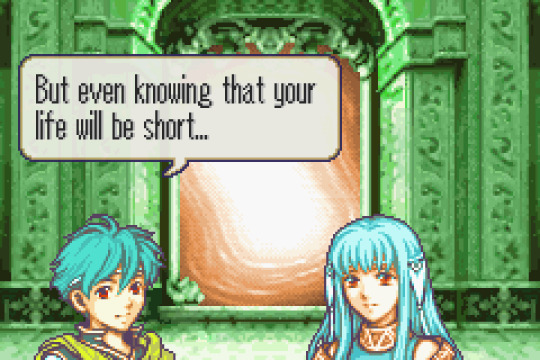
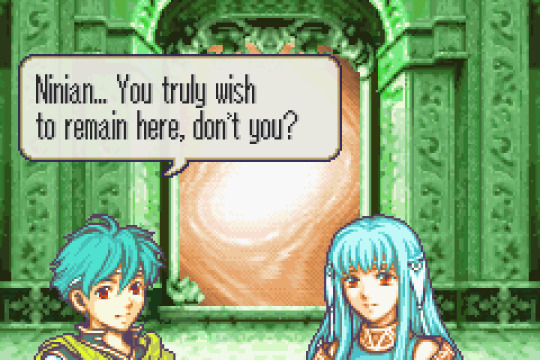
If you raise Eliwood and Ninian’s support level to A, the modified ending to the final chapter, “Light”, has Nils talk to Ninian and explicitly spell out, primarily to the audience, that neither of them will live long if they stay in Elibe. Despite this, sensing his sister’s wish to stay with Eliwood, Nils entrusts Ninian’s shorter life and happiness to Eliwood and says goodbye as he heads through the gate to live a long life, never to be seen again.
Now, granted, what exactly Nils means by “short” and “long” isn’t necessarily clear just in the context of this scene. Since it’s established that dragons live for millennia, you could reasonably interpet “short” as “short by dragon standards”, which could be still be very long by human standards. This read doesn’t hold up particularly well given further context, but just in the scope of what is presented in The Blazing Blade, it’s not patently ridiculous.
But that interpretation only deflects from the real tension at play. From Ninian’s perspective, she is trading away a long, happy life in another world with her brother for a significantly shorter, but potentially happier(?) life in Elibe with Eliwood. Whatever “short” might mean by human standards (including the player), it’s definitely short by Ninian’s standards.
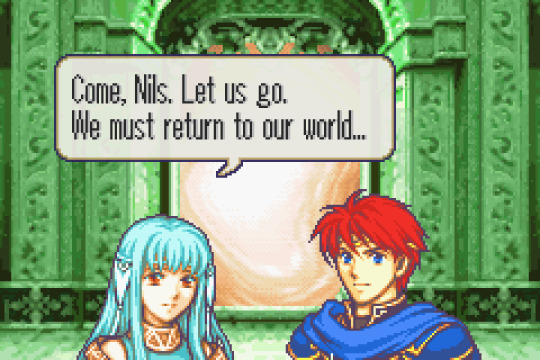
From an in-universe perspective, there’s no actual tension from this decision. Nothing in the text suggests that Ninian is making this choice out of anything but her own free will. In fact, Ninian was fully ready to leave alongside Nils and was saying goodbye to Eliwood, only stopping when Nils chimes in and essentially give her and Eliwood his blessing to stay.
The tension arises when viewing all of this from a meta perspective; namely, that the writers saw fit to make this Ninian’s fate. Even as someone who likes the pairing and likes the way it plays out, because it’s effectively setting an angst time bomb, I’d be lying if I said this narrative beat felt... questionable. Like, Ninian is a character developed enough to have an identity outside of being one of Eliwood’s love interests (see also: her relationship with Nils, her other supports with Hawkeye and Florina), but making her final major act of agency be consigning herself to a brief life with Eliwood doesn’t exactly instill confidence that she actually is more than Eliwood’s love interest.
None of this, on its own, is all that noteworthy. What is noteworthy, however, is that everything I just mentioned is contingent entirely on raising Eliwood and Ninian’s support level to A. Since Ninian is only available for deployment (and, by extension, for developing supports) for seven or eight out of over thirty chapters, and Eliwood must not have more than two support conversations with other characters, this is actually quite difficult to do intentionally, let alone accidentally. If Eliwood and Ninian do not have an A-Support, then Ninian leaves with Nils as she intended to, and quite likely lives a long and happy life with her brother.
As such, knowledge of this ending imposes a special dilemma on players who do like Eliwood and Ninian together. Do you manifest their pairing in your game, etching their union into the personal canon of your save while also ostensibly dooming Ninian to a simultaneously canonical early death? Or do you instead leave them unpaired, saving Ninian in the personal canon of your save while avoiding leaving any canonical trace that the two could even be happy together and settling for other, external ways to express your preference?
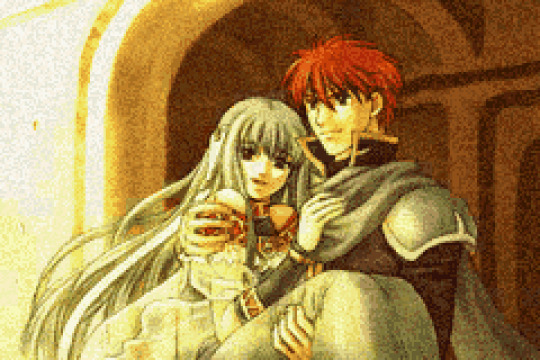
I’d wager some people don’t actually see this as a dilemma, since it’s contingent on placing what they would see as undue focus on canon, and all that matters is what is expressed to the outside world, to others, which most commonly takes the form of fanwork. Whether or not the ending is actually achieved, the shackles of canon can only weigh down those that respect it, and it’s trivially easily to pick and choose as needed. What’s the issue?
And while I am ultimately of that mindset, I also think it is useful to at least sometimes take canon as it is and properly think through the implications, however inconvenient or unpleasant they might be. Canon, after all, is only what is assumed to be the common ground for all participants, so it’s at least worth thinking about how things would have to play out canonically, if discussing works of fiction with other people is something to be valued.
I bring this up as someone who’s been sitting on an Eliwood/Ninian fic that tries to explore how Ninian (and to a lesser extent, Eliwood) would go about living in the time between The Blazing Blade and The Binding Blade, with the knowledge that she’s not long for the world perpetually lingering over the two. It’s something I’ve been thinking about ever since I learned about the way the pairing plays out in The Blazing Blade for the reasons highlighted above. Doomed relationships are nothing new in video games, but this specific kind of doomed relationship, where actualizing it necessarily brings about an otherwise avoidable death, is considerably rarer.
It’s not all that surprising that I personally would take to it, since it’s an obvious wellspring of angst, but it’s one that requires some legwork to really hit. It’s one thing to die, mourning for a potential that was never realized; it’s another (and in my opinion, more gutwrenching) thing to actually realize that potential then fade away, believing wholeheartedly that it was all worth it in the end.
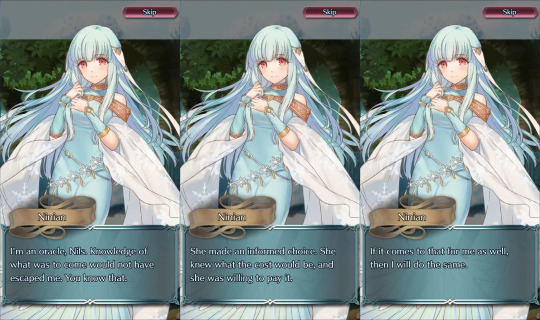
Canonically speaking, if Eliwood and Ninian were to be together, it could only ever be for a few years. And through her actions, we, as an audience, are to believe that spending a few years with her beloved Eliwood would make Ninian happier than spending many years amongst her kind in another land would.
And as someone who on some level wants the two to be together, I feel at least some obligation to try to imagine a life where that holds true, in my own small way, even if such a life is bound to end in tears.
#ninian#eliwood#fe7#blazing blade#the blazing blade#fire emblem the blazing blade#elinini#angst#fanfiction#fanfic#canon
51 notes
·
View notes
Photo
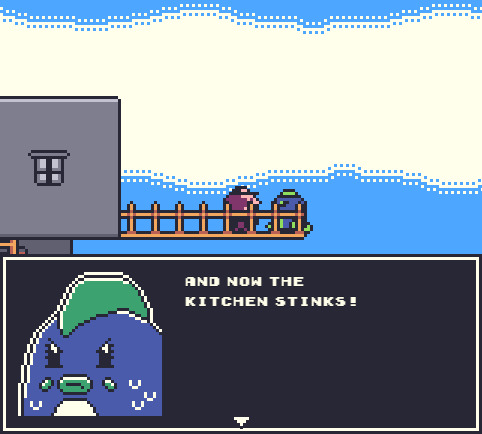
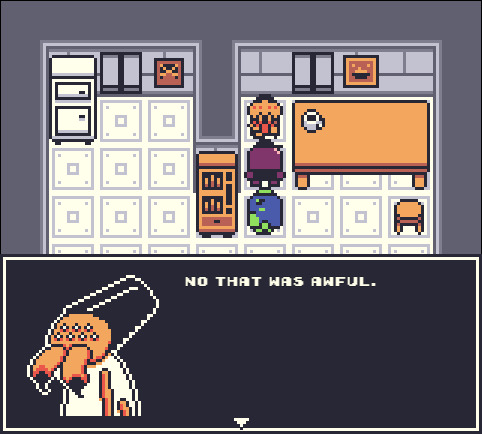
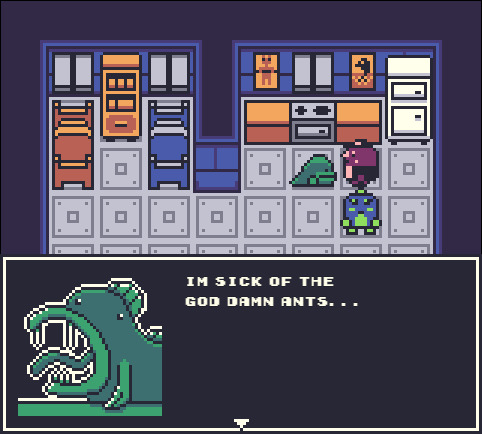
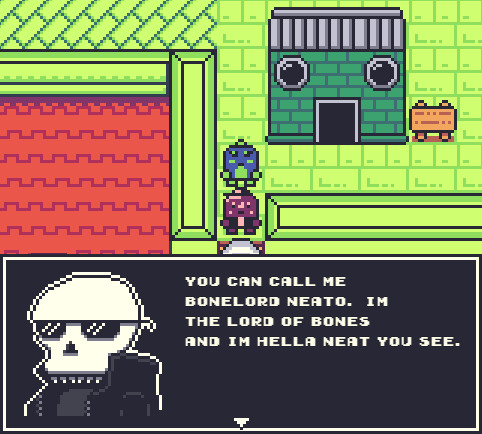
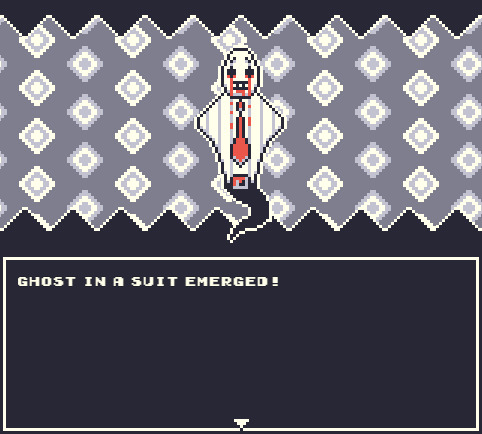
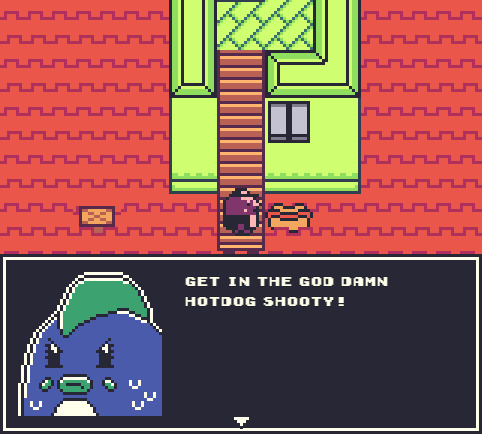
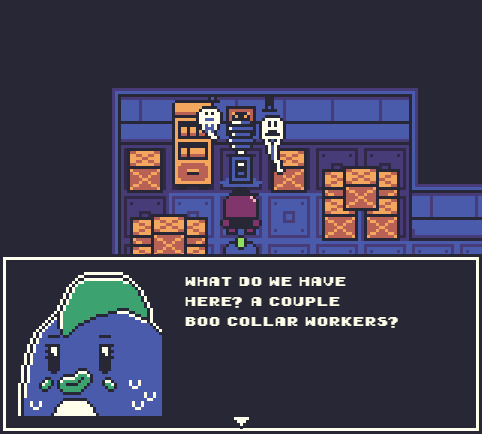
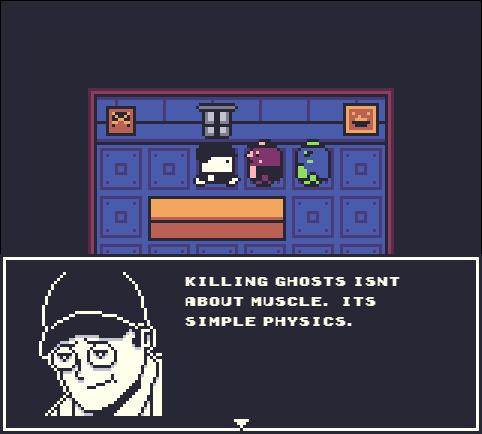
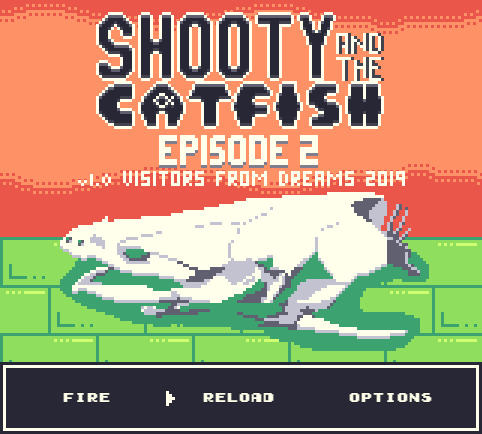
Well its done, "Shooty and the Catfish Episode 2: The Spoopies" is finally out in the wild for people to play, why you can even play it yourself for free if you head on over here: https://visitorsfromdreams.itch.io/shootycatfish-episode2 Truth be told the game has been out for 3 days now and has only been downloaded a grand total of 4 times. It might seem like a discouraging number for sure but its important to remember that this is the second episode of a series, and with the first episode itself only being downloaded a total of 124 times to date (my previous project Hazmat is sitting at 525 downloads and Flatwoods at 849 downloads) its not that surprising. In all honesty im not really expecting the series to really gain any sort of momentum until its fully finished and released as a stand alone product on Steam, and I think thats fair enough. The idea behind the episodic releases was largely so I could get the feedback to improve each episode as the project went along, and I think I have achieved that so far. So I guess you could consider this to be a post mortem. Where did things go right with Episode 2 and where did they go wrong? Well, for where things went right, development started in March and was finished in September so you could say the game had a 7 month development cycle. Looking back at it now due to the length of the episode that actually feels really excessive considering the amount of content in the actual game (which I will come back too) but compared to the first episodes 2 year development cycle it was a huge improvement. I am also pretty happy with how the games set up worked. Episode 1 played it very strait with its single town and non linear dungeon set up taken right from the standard JRPG guidebook. Episode 2 on the other hand was a little more experimental. The opening town was more about establishing a tone then a solid narrative with the Episodes dungeon being where all of the real story telling happens. While im sure this isnt a new idea, its something I havent personally experienced in any turn based RPGs. Sure, its not uncommon to find environmental story telling packed into the game world, but to have every combat encounter also be an NPC that pushes the narrative forward? I think the results were perhaps a little wordy and at times a bit on the nose, but for the most part I think it works. Episode 1 had a very non linear dungeon which worked well but it was nice working on something a little more directed as well which Episode 2's layout definitely was.
Im really happy without how the quality of life improvements in the game turned out, introducing new elements like coded doors for different kinds of keys and giving you the option of finishing the game without fighting the optional boss which, you know, actually made that optional boss optional. In fact I was so happy with those changes I went back and patched them into Episode 1 only a couple weeks back.
So where did things go wrong?
Well, to be honest, the only thing I wasnt happy with was how long it took me to get this game out. Like I said, 7 months is a big improvement compared to 2 years, but its still a lot longer than it should have been. Some of this was definitely my fault... as mentioned above there was a big push to have all the narrative put into the dungeon, but the down side of that was that it meant there was a lot more meaningful dialogue in this Episode than there was in Episode 1. The previous Episodes dialogue was mostly made up of silly gags from goofy NPCs in town, but for this Episode I had to create that ALONG with the more serious and narrative driven dialogue found in the dungeon itself. There were several weeks where I didnt touch the game at all because it all seemed so daunting. Ironically when I finally forced myself to write those sections it ended up only taking me 2 nights, so really I spent weeks if not months putting the project off out of fear of something that ended up taking collectively 6 hours tops.
So yeah... that explains some of the delay, but not all of it. The second issue that struck me during the development of this Episode was my own insecurity. The first 5 months this games development were during a time when I didnt know what was happening with my job, I was very nervous, and with my fiance being processed through the notoriously awful Australian immigration system I was also pretty damn scared. The last few weeks of those 5 months was a massive period of crunch at work for a huge project and then immediately it was over... and I was out of a job. If I had known for sure that this was how the gig would have turned out I would have spent more of my free time trying to develop a following. I might have even been able to get my Patreon into a state that could have helped me out financially a little, or atleast thats what I liked to think I would have done, but at the time I didnt have the confidence or energy to do so. This was followed with me taking up a freelance project (well quite a few actually but most were great) which while it has definitely paid my bills over the last couple of months, it has also left me exhausted, emotionally and physically. All of this slowed down the development of the game, and perhaps even more importantly had a large impact on the writing of it.
"Shooty and the Catfish: Episode 2 - The Spoopies" deals with some pretty heavy themes, with suicide and the treatment of suicide victims being chief amoung them. Then on top of that I realised half way through development that while the idea of an office building full of ghosts of asshole business people who commited suicide after a stock market crash does have some comedic value (poor taste as it may be), the gameplay loop of systematically killing every single one of those ghosts has absolutely no comedic value and is quite possibly the most morbid thing I had ever created... Ironically not even on purpose... I found myself in a situation where I accidently created a "suicide victims ghost murder simulator". While im no stranger to creating offensive or disturbing content, for once this wasnt my intention but rather the result of the games story concept clashing with the established gameplay mechanics... and realising too late. What do you do when you set out to make a dumb comedy about 2 wise cracking idiots that kill monsters for money and instead... well here we are. What a mess... Im not going to pretend that the game handles the subject of suicide well and I also dont think I ever could approach the subject in a satisfying way. If its treatment upsets or offends anyone I think thats completely understandable and any critism I receive because of it is completely justified. Something I do think that is a positive to come out of all this however is this is the first game project I have worked on that I feel, to me personally, is a piece of "art". Well I mean... I think all games are art, but playing through this game now I can see the struggle I was going through developing it reflected through the characters and through the writing. Its almost like playing through 5 months of my own loose streamed consciousness. My stress, my depression, my insecurity, my fear, my defeatism, its all there. The game has tonal whiplash of morbid nihilism and stupid dumb goofy comedy in a way I havent been able to pull of since my 2014 film Spilt Coffee (https://www.youtube.com/watch?v=jp2HSx_f9WE) which ironically serves as a prequel to this game and was created at a time of my life when again, I felt quite trapped. Episode 2 might be the worst game I have made to a lot of people and thats totally fair, but I think its also my most personal and sincere for what thats worth. Thats it for this update, I have gone on long enough as it is. So where do we go from here? Well... I made myself and my players a promise at the end of Episode 2, and thats that Episode 3 will be a fun light hearted adventure. I think after this games development I really need it, and hopefully the contents of this depressing Episode doesnt stop those players from coming with me on that adventure too. If your interested in helping me support my indie game development then why not check out my Patreon? https://www.patreon.com/VisitorsFromDreams Every little bit helps ~ <3
Thanks again to everyone who has taken the time to read this post.
40 notes
·
View notes
Text
It's always amazing to take part in the fandom with people that truly love the characters.
Name/Handle/Alias
Icefire149
About how long would you say you’ve been rooting for Reylo?
Since shortly after TFA hit theaters. After thinking about the movie I realized the structure felt like everything was pushing Rey and Kylo's plots to the moment they collided. And I thought, oh I can get behind an enemies to lovers story.
What did you think of the way Rise of Skywalker handled Rey and Kylo’s relationship?
Not a single character in TROS was handled well. The sequence when Ben is rushing to her - gets the lightsaber - reaches her - and heals her - that was all really nice. But that is only because of the actors. Their body language and expressions sold it. The movie's plot is clunky and needed to let the actors shine and gradually let the characters connect.
Do you think the film understood why you, and other people, felt like Rey and Kylo had something together? Did it get their chemistry?
The filmmakers are extremely lucky the actors had natural chemistry. Other than that I feel like the film was on the verge of understanding. They opted to spend the time on the fetch quest instead.
What about the handling of Kylo’s redemption? Was it something you had to think through in your stories?
Kylo's redemption was probably one of the most fun aspects of daydreaming about where the plot was going. After TFA the sky was the limit. It could go anywhere. TLJ left us with two interesting paths: he clamps down on his choice to be the Supreme Leader and fully embraces the dark or he cracks so badly the light consumes him. I couldn't wait to see what path TROS chose. What we got was a disappointment. His redemption felt very slapped together. Was it Leia? Did he hear her or was feeling her spirit enough? Did she offer him forgiveness? Was it Rey showing him compassion and healing him? I don't know and I hate that.
How did you handle or would you have handled the redemption of Kylo Ren in your fics? How did you envision Kylo/Ben’s redemption before TROS and how do you (re)envision it after seeing TROS?
After TLJ I favored the idea that he's getting redeemed. During that final scene where Kylo sees Rey through their bond, I felt that he was finally in the middle of his transition. Throughout TFA & TLJ we see Kylo and Rey struggle with the light and the dark pulling them. After the chamber scene killing Snoke, he wasn't quite there yet. He couldn’t commit to being Ben so he tried to convince Rey to join him. And I felt that after getting through seeing Luke again and realizing the state of his life, he's left feeling like he might want to be Ben. And he sees Rey through the force and has to confront that everything with Rey was real. She saw Ben and that vision can be a reality, but he doesn't know if that opportunity will come again. So I saw TROS opening on a Kylo that is so fractured he's barely being held together. Who is he? What does he want? This leads to massive friction with the First Order and the Knights of Ren. They expect a leader. A plan. And he will not make a move on the Resistance. Even though they know after TLJ they are so close to crushing them. This would lead to Hux leading a coup to get him locked up. Hux wants him to see what a better Supreme Leader he will be so he leaves Kylo alive. Just locked up. This gives us time to see Kylo shatter all together. The ball has been rolling since seeing Luke. Ben has to confront everything in his memory. All the bad he did and what was done to him. All this conflict should filter through the force to Rey. There's room to bond over fears and past traumas. Between this and confiding to Leia about the force bond with her son, Rey should really begin to understand his actions. Ultimately, he will chose to be Ben and by letting the light in he can connect to Luke and the other force ghosts. By the middle act he should be rescued / escaped from prison and end up as a valuable asset to the Resistance. His knowledge outweighs their lack of trust in him. They need him. And he needs to work towards making amends, starting with destroying the FO so the universe can begin healing.
What did you think of where Rey landed at the end? There had been a lot of excitement around Star Wars having a female protagonist. Do you think she lived up to the promise of her character?
Rey’s character was something to be excited about. She was a survivor. Quick thinking. Her interest in flying led her to being a pilot in theory and then had to hope it was enough when her and Finn steal the Falcon. She was sad but hopeful. Her kindness and compassion led her to helping BB8, Finn, the Resistance, and Kylo. Her racing to Kylo in TLJ was the ultimate testament to her compassion. She saw Ben under the mask. She saw a chance to bring Leia and Han's son home. The force awakened in her and both sides of it began pulling at her. And despite all her anger and pain over the hard life she had been living, she still kept reaching for the light in the end. TROS felt hollow. Where was the Rey we've been following? Where was her growth? None of her relationships felt like they grew. And suddenly everything she did before was moot. Her powers - because of her blood. Her skills - because of blood. Her compassion &choice to follow the light - because of her choosing to be the new skywalker heir.
There’s criticism of the movie that argues it’s akin to “fan fiction” and that is has too much fan service. As fans and fan-fiction writers, how do you react to that?
It feels like an insult to fan fiction. Fan fiction generally serves to explore dynamics between characters, subtext, and plot points in ways and usually in deeper meaning than the canon material ever dared to go into. TROS managed to ignore established plot threads and character arcs in favor of half heartedly appealing to as many fans as possible. Savages tormented the actress that played Rose. The movie didn't dare cut her out completely because there are still tons of people that love her. Solution: you could blink and miss her. People sure love their ships and Disney loves sinking them. Also just to hammer home that Finn and Poe are not an option we need to add in some love interests. People want some plot threads linking back to prequel material like force ghosts. Let's just add in some rapid fire narration that didn't satisfy anyone. Kylo is a hot topic so lets: slap a last second redemption on him without going into his back story or seeing him make amends, he heals Rey, gives a smooch for the Reylos, and kill him with no resolution so the people thirsting for his blood since he killed Han are satisfied. And the people that have been yelling about his redemption can't say there wasn't one. Fan fiction writers at least have the audacity to say when they're ignoring canon. TROS keeps acting like they had no other narrative options.
Tell us about your favorite parts of the fandom. How does the fandom lift you up and embody the best parts of Reylo and Star Wars?
The fan fiction writers and the theorists are my favorites. They look at the material and find new ways of seeing and continuing what's there. Their creativity is inspiring and hopeful. It's always amazing to take part in the fandom with people that truly love the characters.
Are you still writing any Star Wars fanfic? Tell us about it! (Don't forget your Ao3 handle!)
No, not at the moment. I should return to the reylo modern au I started years ago. I outlined all the plot points, unlike what happened with this sequel trilogy....
2 notes
·
View notes
Text
Why We Need to Appreciate Padmé Amidala
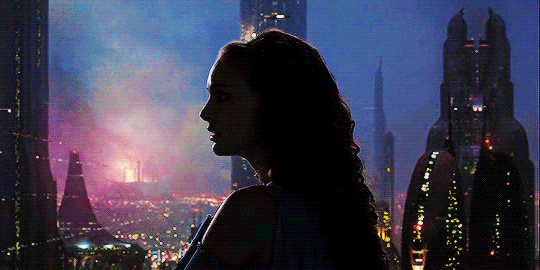
In spirit of #SWisagirlthingtoo making its way around Twitter, I thought now would be the perfect time to make a post I’ve been wanting to write for a while. Star Wars up until recently has not given much attention to its heroines, perhaps with the exception of the iconic Princess and General Leia Organa. It is incredibly sad that it has taken this long for the franchise to realise that characters such as Leia, Padmé and Rey (as well as the many animated heroines we have met such as Ahsoka and Hera) have been and will forever continue to be definitive factors in the way many girls have and will grow up.
When it comes to Star Wars, I loved Leia and I love Rey, but they are both not the heroine I connected with. I connected with former Queen and then Senator Padmé Amidala from the highly criticised (although increasingly less so) prequels and then again in the animated series, Star Wars: The Clone Wars. Any Padmé fan knows that loving her as a character most often means you’ll often be told that in the end she did ‘nothing but cry over Anakin’ or is in no way comparable to her daughter, you’ll find it frustrating that no reference is made to her at all following Episode III and you’ll know that she has little to no presence in merchandising even when you are more than willing to throw coins down Disney’s way for her.
But Padmé deserves to overcome all of the above. Padmé constantly has to battle against both what people expected her to be (arguably a Leia clone) and the often restrictive and limiting definitions of what makes a “strong female character”, especially in pop culture. Regardless, here is why Padmé is such an underappreciated and amazing character.
The Phantom Menace:
Padmé is elected queen at 14 years old, a competent and strong leader wise beyond her years. She was educated in public service from an early age, earning the trust of her people after serving as the Princess of Theed and becoming a junior senatorial adviser upon joining the team of Apprentice Legislators from the age of 8.
She is one of the first people to acknowledge and realise the failures of the Republic (“It is clear to me now that the Republic no longer functions”, “Wake up, Senators, you must wake up!”).
She is brave enough to take part in espionage missions in order to allow herself to take part in both negotiations and the action, as well as to keep herself safe.
When the time comes, she is brave enough to reveal herself as the queen even though it is not asked of her.
It is her idea to form the Gungan Alliance and to try retake Naboo herself. She is able to realise that a diplomatic solution is no longer plausible for her home planet and instead of sitting back and ordering action from the sidelines, she fights alongside her people and risks her life in doing so.
She delivers victory, bringing the two species of Naboo together and liberates her people.
Padmé served the full two terms allowed by Naboo’s laws but was so popular as a leader that her people wanted to amend the constitution in order to allow her to remain queen.
Attack of the Clones:
Padmé continues to serve her people as the representative of Naboo in the Galatic Senate, even as her life continues to be threatened and also after she watches her decoy (and friend) die.
Despite more threats to her safety, Padmé is selfless in going with Anakin to Tatooine to try and save his mother as well as wanting to help and rescue Obi-Wan.
Padmé is prepared to put her career first. She denies her feelings for Anakin right until she believes she is going to die on Geonosis and understandably realises that her career does not have to be the only satisfaction in her life. She accepts that she is entitled and allowed to love, even when Anakin does not share the same luxury.
She decides to become committed to hiding her relationship so that she can continue her duties for the Republic as well as attempting to ensure Anakin is not denied his life as a Jedi.
Her every action is not driven by her love for Anakin. She decides to go rescue Obi-Wan when Anakin argues against it and whilst Anakin and Obi-Wan bickered when chained up on Geonosis, she instead took the time to rescue herself and reach higher ground.
Padmé survived the Battle of Geonosis as a clever politician and as a blaster-weilding fighter whilst many other Jedi and trained clones died. She proves again that she can fight.
The Clone Wars:
Padmé essentially becomes a hero through her politics.
We see more of her in action in the Senate, particularly in the episode The Pursuit of Peace where she gives an unforgettable speech. “Who are we fighting for? My people, your people, all of our people. This war is meant to save them from suffering, not increase it. I support our brave soldiers whether they come from the clone factories or from any of the thousands of systems loyal to the Republic… It is our duty and our responsibility to preserve the lives of those around us.” The full version can be found on Youtube.
Padmé continues to be the target of further assassination attempts but continues to expand her power and influence nonetheless.
Padmé cleverly earns the attention of the galaxy’s most important players and is able to come to adaptable and sufficient compromises with them despite differences in beliefs and alliances.
Missions with Ahsoka!!
She again does not let her decisions be influenced or driven by Anakin. When Anakin does not want her to go on a mission he deems to dangerous in the episode Senate Spy, she replies “You’re not going to let me? It’s not your decision to make, it’s mine”. Padmé puts her duty to the Republic first, even when it bothers Anakin on multiple occasions.
She is brave enough to leave Anakin when he violently attacks Rush Clovis, whom she had been previously romantically linked with.
Revenge of the Sith:
Yes, many of her scenes where she is active in the early formations of the Rebel Alliance are cut and we will never forgive George Lucas 5eva. The original ending where she attempts to assassinate Anakin also would have been awesome. This movie is where Star Wars fails Padmé, but her role in it still can not be ignored.
Padmé is able to question the state of the Republic when many around her are too afraid to in fear of accepting what it may truly mean – “What if the democracy we thought we were serving no longer exists and the Republic has become the very evil we’ve been fighting to destroy?”
She recognises that Palpatine has gained too much power in the Senate upon becoming Emperor and reorganising the Republic into the Empire, famously stating “so this is how liberty dies, with thunderous applause”. This leads her to form the early stages of the Rebel Alliance that would ultimately become a deleted scene but should still be considered canon.
Once learning all that Anakin has done, Padmé states that he is “going down a path [she] can not follow”. She is not blinded by love and is able to see his actions for what they are and who he has now become. He ultimately destroyed everything she had worked so hard to preserve.
Whatever way you want to believe Padmé died, she went through unimaginable heartbreak and her emotions should not totally be criticised because her pain will never be understood by most. People also often fail to realise that Padmé’s fate is also that of the Republic. She was fated to die with it as she was symbolic of its spirit. I think it is fair to say that she was never destined to live past the birth of Luke and Leia (despite that one line from Leia in Return of the Jedi which can be argued for) as Vader would never have been fully committed to being Palpatine’s apprentice with Padmé around and her future would have had to have been reduced to one of hiding.
It is Padmé that instills the hope and kindness in Luke that allows him to refuse the dark side and resurface the last bit of humanity left in Anakin/Vader. Luke does not win over his father through combat or power but through embodying the eternal impression of light that his mother left on his father. Like his mother, Luke knows that fighting, or ‘aggressive negotiations’, will not always be the answer. A New Hope is ultimately a product of Padme’s legacy.
I know myself that I would not be the person I am today without my favourite female characters. Through female characters, as girls we can feel as though we have defeated great evils, overcome inner conflicts and sometimes even get to save the boys for a change. We might not be able to pick up a blaster or lightsaber in real life, but we learn it’s okay to take charge and that there is absolutely no reason we should feel ashamed for doing so. We learn that we can aim for and strive for any goal whilst also feeling confident and every bit capable to get the guy on the side if we wish to and that having such feelings should not be seen to diminish our strength in any way.
Padmé carried the weight of her gender throughout the entirety of the prequel trilogy and for that reason alone she was never going to please everyone. She was the new female lead and many hoped she would be a character who was along the lines of being Force sensitive or perhaps even a pilot like Rey. But Padmé’s strength was in being kind when she had every reason not to be and was a force to be reckoned with through her intelligence and diplomacy that helped preserve the security and stability of the Republic for as long as it was able to stand under Palpatine’s manipulative rule. She was the humanitarian the galaxy needed when it began to lose all humanity.
Many people who grew up watching the prequels first probably connect with Padmé more because they never tried to fit her into a mould or an already established idea. But I do hope that fans of any age can come to recognise that Padmé is as worthy of being centre stage in the Star Wars arena as any other female character and I truly hope Forces of Destiny can help bring that about. Of course we need more representation in the Star Wars universe and I will never deny that, but I am lucky enough that I did gain a character from Star Wars that I adore so much. I also appreciate that these female characters can be every bit important to male fans as they are to female fans and any male fan that is able to appreciate our heroines as equal to our heroes is helping fandom and pop culture take a step in a better direction than it has in the past.
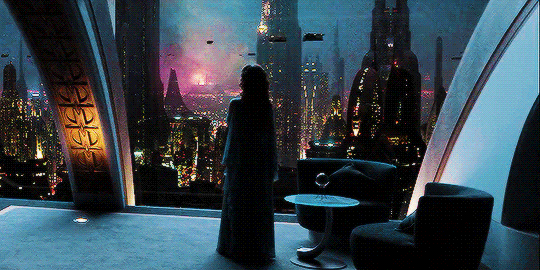
#padme amidala#star wars#women of star wars#prequels#padme naberrie#queen amidala#the phantom menace#attack of the clones#revenge of the sith#TPM#AOTC#ROTS#the clone wars#TCW#forces#forces of destiny#FOD
2K notes
·
View notes
Text
all the posts collating reactions to The Empire Strikes Back or writing mock Rotten Tomatoes reviews to imply that the criticisms of this film aren’t worth paying attention to are just…so missing the point
exactly two works that said what ‘Star Wars’ was existed at the time of Empire’s release in 1980: Star Wars (not yet renamed ‘A New Hope’) and Alan Dean Foster’s 'Splinter of the Mind’s Eye’ (a sequel written in case Star Wars was a flop that could be filmed on a shoestring budget and without Harrison Ford. It’s Wild and puts the lie to the idea that Lucas had any idea where the Skywalker story was going; highly recommend)
in the year of our Lord 2017, The Last Jedi was released as the third film in a revival of a six film, single creative vision franchise, with the added baggage of over two decades of novels, comics, video games, and other media (the only thing ever fully expelled from canon was the infamous holiday special, which, honestly, had greater creative merit than some of the stuff that got to stay)
what’s the point? Expectations. No, not people who didn’t want anything to change and are Mad About It or whatever facile narrative the authors of those blog posts and reviews are using to explain why this film is probably more divisive than the goddamn prequels. The problem is that not only does The Last Jedi clash with decades of fandom, it is even at loggerheads with its sister films in this particular revival. and it doesn’t get the same benefit of the doubt that ESB got because that’s not how franchises and fandoms actually work. you don’t get to ignore everything that came before to tell your own story. they have to work together.
Sure, not everybody read the EU (and trust me some of them are better off for it). But almost everybody saw The Force Awakens, most of them saw Rogue One, and a fair number of them, old and young fans alike, eagerly consumed the New EU content that offered glimpses into how the events of The Force Awakens came about and what mysteries were set up in what was effectively a reboot rather than a sequel. Generally, you know, regardless of how much you hate 'puzzleboxes,’ it is reasonable to expect that what one film sets up will have a payoff in the next, particularly when the first film takes such care to be sensitive to what the fans want (as JJ and Kasden did with TFA) - because while this is a money faucet for Disney, sure, there’s no point in bringing this franchise back without those fans (and of course, their kids) - and what they got from Rian and the Lucasfilm story team was…a confirmation that they had been wasting their time. It’s all well and good to pull the rug out from under the audience (as this film does incessantly) but it’s cynical bullshit to basically bait them with promo material and the preceding canon and then to deliver on basically nothing and expect everyone to just be okay with it. This film effectively penalizes the people who cared the most and spent the most time engaging with The Force Awakens and rewards people who may not have really been here for what Lucas was selling to begin with. As one review put it, it ‘does not care what you think about Star Wars’.
But when you set expectations as deliberately as Kennedy and the Lucasfilm Story Group did in JJ and Kasden’s TFA, it’s not great writing to blow them to pieces mid-narrative. It’s just lazy. the idea that Rey has no connection to the Skywalker line? a good idea, potentially, but clumsily executed, as it is played out less as an important revelation and more an excuse to not actually give any kind of answer to how Rey came to be Ben’s equal on the Light (or why she even is ‘Light’ honestly; I love Angry Rey but there’s seemingly no danger in her temptation) or where she got a skill set rivaled in this franchise only by literal Space Jesus Anakin Skywalker. Snoke is a one-noted villain; having him be betrayed by Kylo in the midst of his own villain arc? a very good idea. it belongs as the climax of the film, not the end of act 2 so there is no time for anything to breathe, just more never-ending crises and hardship.
Like, spare me the 'force visions are unreliable’ (Rey’s was unlike anything we had seen before, it wasn’t Anakin’s nightmare or Luke on Dagobah) bs; the film didn’t say that what Rey saw was wrong for x reason, it just pretended that it never happened and Rey didn’t say anything about it); spare me ‘our heroes have to fail and sometimes all the plans don’t work out’ we know that, we live in the real world of 2017 but while making your clever point you have wasted the presence of three extremely talented actors of color, and let down the audiences waiting for a chance to see people who look like them be the heroes for once. instead it turns out they didn’t actually matter all that much, but maybe next film!
It’s not clever. It’s not visionary. It’s cheap, it’s cowardly, and it isn’t actually that original because the film leaves us exactly where we expected. Poe is the leader and Leia’s heir to command, Finn is a newly-committed Rebel brimming with unrealized potential, Rey is a Jedi character (amorphously defined) who we know exactly as much about as we started, Luke is gone, even if he went out in pretty spectacular fashion, Carrie’s death means that Leia will be leaving us soon, and Kyle Ben has become the big bad. That’s the only real development - Snoke’s death and Ben’s rejection of his redemption - and it’s buried under Rey, our erstwhile heroine, being a vehicle for the villain’s character development. The only character this film particularly cares about is a white fascist who gets every chance to be redeemed and rejects them while the film expects us to keep caring.
So, yeah. People are mad. Not because of the same ‘the series is changed forever now’ shit that the haters of ESB were on about. Because the real changes? Ben being the real villain, the smallfolk of the galaxy being the source of light and conduits of the Force? I don’t see anyone complaining all that hard about them.
the complaints are about the damage done to beloved characters for…not all that much of a payoff. the misuse and marginalization of the characters of color. the disdain with which the script treats the nostalgia of the Force Awakens. the unrelenting pace of the film that just grinds the Resistance (and the audience) down and just tells them to trust us, even as more and more and more is taken away. Rey’s parentage isn’t the only thing cast aside - promises of developments in Finn’s story - his identity, his potential to cause a revolt in the First Order, even his force sensitivity (you want a force user from nothing? how about a child soldier from a nameless family who as we are continually reminded used to be on sanitation crew) - are broken. Rey has her dream of family taken away…and replaced with…well the film doesn’t really bother to say because she’s a plot device for most of act 3. We don’t get to see her reject Ren and leave him. Because this isn’t her story; it’s his. Kylo is unconscious, so the scene is over. Tell me how that is a satisfying arc for our erstwhile protagonist? Poe’s character is completely uprooted from what we’ve seen before to make him an obnoxious hotheaded menace whose emotions threaten the survival of the Resistance if two old white women aren’t able to keep him in check. Rose says a lot and gets to do almost nothing. Luke…Luke is torn down to justify the fall of Ben Solo, never given the chance to establish a meaningful bond with his erstwhile successor, and is only given the chance to atone by acting as a diversion to give the others time to escape. he dies alone, a failure, even if he is at peace with how things turned out.
last year we were shown a movie in the wake of one of the more traumatic political events in the life of the people on this website where a diverse and sympathetic cast fight hard and are entirely wiped out. But their deaths come in a spectacular and charged finale that carries the desperation and grief and pathos through into the beginning of the story we know and love. it all feels worth something. Rogue One has its flaws as a film but it comes together in a way that The Last Jedi does not. In the end, what Jyn and Cassian and the others do is just enough to get the plans away, to start the sequence of events that will lead to the Empire’s destruction.
Here?
there’s just not enough left. not enough of the Resistance, not enough story, not enough hope.
to have that hope repeatedly stripped away and cynically exploited through a narrative that drags the characters from crisis to crisis without bothering to justify itself or its role in the story (while retreading the highlights of Episodes V and VI without the emotional depth to back them up), and in so doing wears down the audience as much as the characters is not why I have devoted so much of my life and emotional energy to this series about space wizards and their galaxy-destroying family squabbles and eventual chance for redemption. for all his many, many faults, George Lucas understood that.
you can’t just talk about hope. sooner or later you have to see it. You have to feel that what you are suffering will be worth it. The text needs to tell you as much. it’s clumsy and cliched and it is necessary. In the Empire Strikes Back, after Han is captured and Luke is beaten, the turning point is Lando. Lando changes the course of the movie, rescuing Leia and Chewie, who rescue Luke. They live to fight another day, and at the end they are wounded but among friends.
the moment in The Last Jedi where that could have happened was when Leia’s signal went out. How terrific would it have been if after being betrayed by a scoundrel the original scoundrel with a heart of gold, Lando Calrissian, arrives at the head of a fleet made up of all the alien races so inexplicably missing from the sequel trilogy so far, fending off the First Order long enough for the Resistance to escape with most of the survivors on Crait?
But Rian had to have one last twist of the knife. so nobody came. only Luke, and only as a distraction to buy time that ultimately cost him his life and reduced his legacy to giving everything to atone for his past sins. there is no Lando moment. there is no turning point, no moment where a larger victory is hinted at. and no, a single stable boy far, far away from the war is not the same thing. It makes an interesting point about the force and the metanarrative of Star Wars. It is not what this film needed after everything it put its characters and audience through.
and so at the end I’m not hopeful. I’m just tired. So, very tired. And I miss what made me fall in love with this series about space wizards and the Skywalker family in the first place
#martinus watches the last jedi#the last jedi spoilers#tlj spoilers#tlj negativity#rian does not love star wars like I love star wars#I'm just so. tired.#I need to watch Rebels or ROTJ and remember Star Wars can be like fun
30 notes
·
View notes
Text
WandaVision: What Is Nexus?
https://ift.tt/eA8V8J
This article contains WandaVision spoilers.
We got at least one big reveal in the seventh episode of Marvel’s WandaVision, and though it was indeed a key turning point that we’d been expecting since the series began, it wasn’t quite what some fans hoped for. There are still two episodes to go, however, and we suspect there might be more huge reveals left to come, and yet more wild commercials that many of us will spend hours picking apart.
The commercial in episode 7 was for an antidepressant called Nexus. The term “Nexus” has ties to the established MCU and Marvel Comics, and we’re here to talk you through what you need to know about the ramifications Nexus might have in both WandaVision and Doctor Strange in the Multiverse of Madness, for which WandaVision essentially acts as a prequel series.
So, let’s get down to business!
The Avengers: Age of Ultron Connection
Avengers: Age of Ultron has been referenced heavily in WandaVision to date and, yes, there is a Nexus connection to be found in the 2015 blockbuster that properly introduced us to both Wanda and Vision. In Age of Ultron, NEXUS is an internet hub in Oslo that Tony Stark visits when he’s tracking Ultron’s attempts to get nuclear codes. When Stark arrives at NEXUS, he finds that JARVIS has survived Ultron’s attacks by scattering himself on the internet.
Is the commercial a random reference to AoU’s NEXUS internet hub? Perhaps, but the Nexus ad voiceover is very telling, and speaks to a much larger reveal on the horizon:
“Feeling depressed? Like the world goes on without you? Do you just want to be left alone? Ask your Doctor about Nexus, a unique antidepressant that works to anchor you back to your reality, or the reality of your choice. Side effects include: feeling your feelings, confronting your truth, seizing your destiny, and possibly more depression. You should not take Nexus until your Doctor has cleared you to move on with your life. Nexus: because the world doesn’t revolve around you. Or does it?”
When we last saw Wanda Maximoff in Avengers: Endgame, she was just starting to grieve the loss of Vision, but we now know exactly how unhealthy Wanda’s grieving process was, and it was probably made that much worse when she found out about SWORD Director Hayward’s Vision-tampering CATARACT project.
Wanda admits she created Westview as a result, but still isn’t quite sure how she did it, and even in the often idyllic world of Westview she hasn’t really been able to block out her depression. In fact, it appears to be overwhelming her a little more with each passing episode, and that’s never been more evident than in episode 7, “Breaking the Fourth Wall,” where Wanda uncovers the truth about who has been behind some of the most nefarious magic in The Hex: nosy neighbor Agnes, aka iconic Marvel Comics witch Agatha Harkness.
The Marvel Comics Connection
What does the Nexus ad truly tell us about where this is leading? The medication certainly appears to be a rather ‘unique’ antidepressant in the surreal realm of WandaVision because it promises to stop the patient suppressing their depression and loss rather than help them dull those feelings, but in a very real sense “Nexus” could bring Wanda back to reality and fully establish her role in Phase 4 of the Marvel Cinematic Universe – and it probably will involve help from a very specific Doctor!
See, in Marvel Comics, the Nexus refers to the Nexus of All Realities, and it’s quite different to its underwhelming MCU internet hub counterpart. First appearing in 1972’s Fear #11, the Nexus forms a cross-dimensional gateway that provides access to all possible realities and is a place where all the realities of the multiverse intersect. Wanda Maximoff herself is often referred to as a Nexus Being, a multiversal anchor who serves to protect us from threats outside our reality.
As the ad says, Nexus works to either “anchor you back to your reality,” or one of Wanda’s choosing, like The Hex. Wanda could be about to discover that the reason why she suddenly had so much control over reality is because she is a Nexus Being connected to the powerful mystical node that provides access to anywhere in the grand multiverse. If so, it’s only a matter of time before Wanda’s Doctor – Doctor Strange, that is – shows up to try and prevent things deteriorating in Westview even further.
To be honest, since it’s already confirmed that Strange and Wanda get caught up in the ‘Multiverse of Madness’ in Sam Raimi’s upcoming Doctor Strange sequel, we’re not entirely convinced that the pair will be able to deal with the Nexus’ existence on Earth all that smoothly, but WandaVision is almost definitely heading for a huge, big budget MCU-style climax over the next two weeks with at least one huge cameo in the offing.
The excitement is real.
cnx.cmd.push(function() { cnx({ playerId: "106e33c0-3911-473c-b599-b1426db57530", }).render("0270c398a82f44f49c23c16122516796"); });
The post WandaVision: What Is Nexus? appeared first on Den of Geek.
from Den of Geek https://ift.tt/3qAiRmh
0 notes
Text
Dark Crystal: Age of Resistance Season 1 Ending & Future Explained
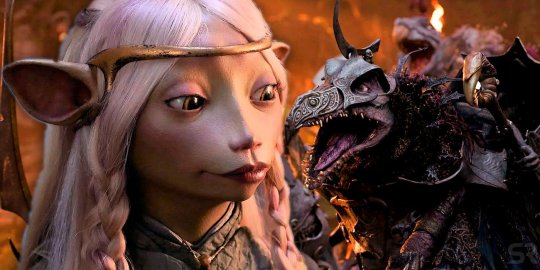
Warning! SPOILERS ahead for The Dark Crystal: Age of Resistance and The Dark Crystal movie.
The Dark Crystal: Age of Resistance season 1's ending not only sets up the events of the original Dark Crystal movie, but it outlines where the series could go in future seasons. Age of Resistance is a prequel to the 1982 film directed by Jim Henson and Frank Oz, featuring again the stunning puppetry and effects of The Jim Henson Company. The 10-episode series greatly expands on the lore of The Dark Crystal, pulling much of its inspiration from Henson and Oz's original notes on the world and creatures from the original film.
In The Dark Crystal: Age of Resistance, three Gelfling - Rian (Taron Egerton), Deet (Nathalia Emmanuel), and Brea (Anya Taylor-Joy) - discover that the ruling lords of Thra, the Skeksis, are draining the Gelfling of their essence in order to prolong their own lives. They struggle to convince their fellow Gelfling of the atrocities taking place, eventually needing to travel to a sacred site, the Circle of the Suns, in order to learn the truth about the Skeksis, their world, Thra, and the Dark Crystal. There, Rian, Deet, and Brea gain the knowledge they seek, but it alone won't be enough to defeat the Skeksis and save Thra.
Related: Dark Crystal: Age of Resistance Cast & Character Guide
The Dark Crystal: Age of Resistance season 1 ends with the Gelfling winning a battle against the Skeksis, but sadly, this victory only marks the beginning of what will be a very long and troubling time. And not just for the Gelfling, but for all of Thra. Still, the Age of Resistance season 1 ending isn't totally without hope. Here's what the ending of The Dark Crystal: Age of Resistance season 1 means for the future of the series and how it can connect with The Dark Crystal.
The urSkeks Explained
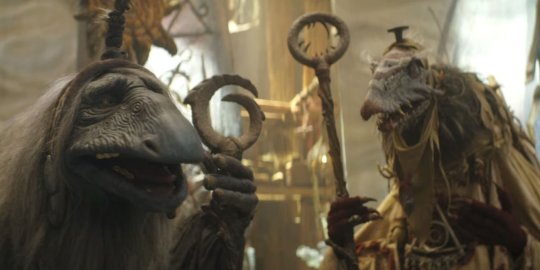
Upon reaching the Circle of the Suns, Rian, Deet, and Brea (as well as their Podling friend, Hup) meet a most strange pair - a Skeksis known simply as The Heretic, and an urRu called urGoh the Wanderer. The odd couple perform for them a puppet show ("that most ancient and sacred of arts") that reveals a startling truth: every gentle urRu (Mystics) and cruel Skeksis are one half of another whole being, the urSkeks. It's a reveal The Dark Crystal: Age of Resistance holds until this moment, but one that anyone who's seen the original Dark Crystal has been anxiously awaiting.
Since having learned the truth themselves, all The Heretic and urGoh wish for is to be reunited - and perhaps in their deaths, which interestingly aren't really explained, they are reunited. The other Skeksis, however, don't appear at all interested in being reunited seeing as professing such a desire is why they banished The Heretic in the first place. This detail, though, does and will continue to factor in to Age of Resistance's story. During the final battle, the Archer kills himself, and his other half, the Hunter, up and dies at the very same time, only further emphasizing the link between the two species. And we can only assume that with the deaths of both the General and the Collector, there must also be two corresponding Mystics who die.
However, knowing the truth about the Skeksis is only one step on the path to defeating them. In order for the Gelfling to free Thra from their grip, they're going to need to fight together as one.
The Crystal Shard Reveal Begins The Age Of Resistance

A new age dawns in Thra at the end of The Dark Crystal: Age of Resistance, born from the battle at Stone-in-the-Wood where the Gelfling send the Skeksis scrambling back to their castle. But more importantly, this battle marks the moment when the seven Gelfling clans are united as one thanks to the Dual Glaive. As foretold to them by The Heretic and urGoh, the creators of the Dual Glaive, this sword holds the power to unite the Gelfling and defeat the Skeksis because it "carries the spirit of Thra." The battle at Stone-in-the-Wood proves this to be true, but it's not just because the Dual Glaive is some special sword that can communicate via the fires of Thra or suck the stolen essence out of Skeksis - it's because the Dual Glaive holds the Crystal Shard!
The reveal that the Crystal Shard is the gem in the hilt of the Dual Glaive is hugely important, as anyone who's seen The Dark Crystal will attest. The loss of this shard when the Crystal of Truth was cracked in the aftermath of the split between Skeksis and urRu is why it darkened and became The Dark Crystal. Returning the shard will not only heal the Crystal, it will also reunite the Skeksis and urRu together in their urSkek forms. Now that the Gelfling possess the Crystal Shard, they are finally a real threat to the Skeksis' power.
Related: Dark Crystal: Age of Resistance World, Creature & Terminology Guide
The Skeksis Create the Garthim
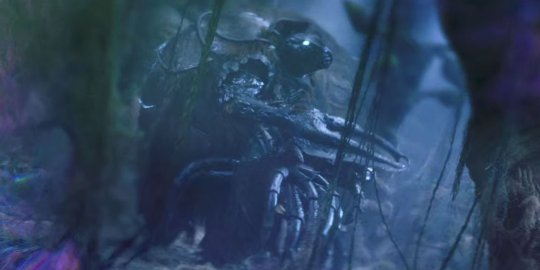
In The Dark Crystal: Age of Resistance ending, the Gelfling appear well on their way to saving Thra and defeating the Skeksis. Unfortunately, it's only going to get much harder for the Gelfling in the years between now and The Dark Crystal film, and the final scene of Age of Resistance offers up one big reason why - the Garthim.
The Garthim play a large role in The Dark Crystal film, acting as the Skeksis' personal guard and army. They are ruthless monsters with no purpose other than to destroy and they will be the biggest threat to the Gelfling from this point on. Not to mention, learning that the Garthim are not merely a Skeksis creation, but one made from the gruesome combination of two native species of Thra - the Arathim and Gruenaks - only makes them all the more horrific.
The creation of the Garthim signal that the devastating Garthim War is not far off. It also means more Skeksis, like skekUng, the soon-to-be Garthim Master, will be returning to the castle. The Gelfling may have won a great victory against the Skeksis at Stone-in-the-Wood, even recovering the Crystal Shard, but their battle to free Thra is far from over.
Deet's Darkening Transformation Explained
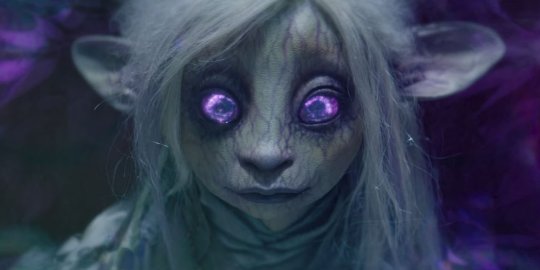
Much of what is revealed in The Dark Crystal: Age of Resistance season 1 ending is already established thanks to The Dark Crystal film. This includes the truth about the Mystics and Skeksis, the discovery of the Crystal Shard, and creation of the Garthim. However, there's one major event from Age of Resistance that is never referenced by the film and is, therefore, left as one of the series' biggest surprises - Deet's transformation.
What happens to Deet in Age of Resistance is never fully revealed, but in being gifted the powers of the Sanctuary Tree, she experiences a crucially important vision and gains the ability to absorb and manipulate the Darkening (a terrible blight seeping from The Dark Crystal and tainting all of Thra). Deet's vision is a hint of what's to come - even including a scene taken directly from The Dark Crystal movie - but it also suggests that her new powers will lead a cruel fate.
The final shot in Deet's vision shows her seated on the Skeksis Emeperor's throne, her face streaked with purple veins. This isn't all that different from how she appears after absorbing and firing the Darkening energy back at the Skeksis during the battle at Stone-in-the-Wood, suggesting her condition will only get worse each time she manipulates the Darkening. Following the battle, Deet is seen by Rian wandering away from everyone else, and in her wake, the plants of Thra wither and die. Deet is being changed by the Darkening, that's clear, but does this mean she could actually turn evil and join the Skeksis as her vision might imply? Hopefully not, but Deet becoming a vessel of the Darkening most likely won't have a happy ending.
What Comes Next For The Dark Crystal: Age of Resistance?
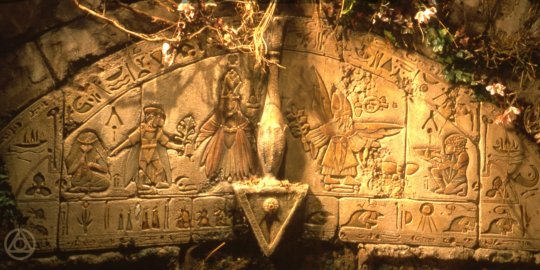
The Dark Crystal: Age of Resistance is the beginning of a story that's already had its ending told in the film, The Dark Crystal. Luckily, that hasn't really hurt Age of Resistance's storytelling as there is quite a lot of left to be explored between the two points in time. There hasn't yet been an official number of years given for how much time passes between Age of Resistance and The Dark Crystal, but there is at least one clue that suggests it's many, many years - the Wall of Destiny.
In The Dark Crystal, Jen discovers an ancient Gelfling ruin called the Wall of Destiny that depicts how to heal the Crystal with the Crystal Shard. The carving, it's implied, is very old by this point. Just how old isn't clear, but this suggests there's a significant time-frame in which Age of Resistance can tell its story. It's possible, and even likely, that something like the creation of the Wall of Destiny is what's next for Age of Resistance, with the Gelfling next learning how to heal The Dark Crystal now that they've discovered the lost shard.
There are other events which must happen, too, like the Garthim War, but perhaps what's most devastating is the knowledge that before the Age of Resistance ends, the Gelfling must lose. Their victory over the Skeksis happens in The Dark Crystal and that means Age of Resistance must show defeat of the Gelfling. All hope is not lost, of course, but this hints at a very somber The Dark Crystal: Age of Resistance ending.
Next: What To Expect From Dark Crystal: Age of Resistance Season 2
source https://screenrant.com/dark-crystal-age-resistance-season-1-ending-explained/
0 notes
Text
Power Rangers 2 Wish List
I loved the new Power Rangers and even though it didn’t do great at the box office, I’m hopeful for a sequel! I think the proposed 5 sequels/prequels plan will be pared down a bit in light of the box office take, but that’s just an opportunity for Saban and Lionsgate to focus on delivering a tight, fun, and entertaining follow-up built on the excellent foundation of the first movie. I was impressed that, even with modern teen struggles and a more grounded take, the movie never felt ashamed to be Power Rangers, and that should definitely continue. Here are a few things I’d love to see in the sequel!
More Trini and Zack! I liked what we got from the team in the first movie, but Zack and especially Trini felt underutilized and underdeveloped. Hopefully that’s remedied in the sequel. Billy trying to increase/stay in his morphed state permanently to protect himself was an idea I had a while back (which also briefly appeared in the Mighty Morphin’ Power Rangers comic), but maybe it could apply to Trini or Zack instead. Trini had big walls set up because of her parents and Zack’s fun persona is a shield against the impending death of his mother, so either one of them could feel like they need a little extra power to get through their lives for a bit. It’d be interesting to discover how much of Zack’s bravado is real and how much is a mask. How will the inevitable loss of his mother affect him, and how will that affect his performance as a Ranger? Billy lost a parent too, but it seems like Zack is primed to delve into the “I have all these amazing abilities but still couldn’t save this important person” trope, and investigating the Rangers’ inability to save everyone (especially after reviving Billy in the first movie) through the eyes of their most jovial member would be a new angle. They could also explore what his potential could be if he weren’t spending all his time ditching school.
Like I suggested in my review, Trini’s helicopter parents provide the perfect setup to play with her trying to sneak out of the house using her superpowers or to subvert the “keep your identity secret” superhero trope with her sarcasm. Another way to go is to establish she’s got an aptitude for science, so she and Billy can team up on that like on the show. Since Trini is the first LGBTQ superhero in a movie, exploring those romantic relationships in detail would be groundbreaking. Whatever they do with them, Trini and Zack definitely need equal focus in the next movie.
Explore How Being Rangers Affects Their Lives Will the team being forced to open up to each other for their powers to work create awkward situations where they have to talk to continue being an effective team? Will they have any privacy or secrets from each other from here on out? Since they’re teenagers, exploring that aspect of their bond is a great way to inject some comedy and drama to the Rangers as a unit.
How were the kid’s pre-Rangers dreams changed by becoming superheroes? What did they want to be? Do they even have those kinds of options now that they’re heroes? Can they hold down an afterschool job if the city is overrun with monsters? Kimberly’s aspirations were dealt with in her exit from the series, but not all the Rangers got that chance and looking at that kind of thing would be great character development here too.
Billy Adds to the Ranger Arsenal In the original show, Billy invented the team’s wristwatch communicators and tied them into the Morphing Grid, allowing for teleportation to and from the Command Center at will. Something similar would be cool here, especially if the writers don’t want to spend time sending the kids through that complicated cave/underwater sequence every time they need to speak to Zordon. I’d also love to see the other Ranger-specific weapons make an appearance (Zack’s ax, Billy’s lance, Trini’s daggers, and Kimberly’s bow) since Jason got to use his Power Sword in the first movie. Maybe Billy could figure out how to manifest those other weapons for each of the Rangers. I wouldn’t mind his tinkering smoothing out the Ranger uniforms either: I prefer the more simplistic designs from 1995’s MMPR movie (I don’t hate the new ones, I just found them over-designed and too busy).
One aspect of the Rangers mythos that was missing from the movie was a true “It’s Morphin Time!” moment, since the kids’ bond opened the Morphing Grid to do it for them. While the kids are already superpowered out of costume and don’t have morphers, perhaps Billy could build mobile devices that connect directly to the Grid in the event of an emergency without needing to depend on the unity of the team. This could create drama by accidentally disrupting their connection, since they’ll no longer always have to be fully connected, which could then turn around and save them if Tommy Oliver betrays them, totally shattering their bond for a time.
The Teens Do Martial Arts I didn’t mind the Power Coins granting the kids superpowers when not fully morphed (the villains were scaled up enough to necessitate this), but I’d like the team to learn some finesse to go along with their brute force. Each of them could develop their own style of fighting like on the show, which would add variety to fight scenes. Kimberly’s past as a cheerleader, for instance, could include a heavy emphasis on gymnastics. Zack could develop his capoeira-like hip hop kido, or something similar. The first time Zack sees Trini, it looks like she’s practicing Kung Fu or Tai Chi, so perhaps she could teach the team members who don’t know martial arts already. While Jason was a former football star, it’d be a fun switch to make the girls the most athletically proficient.
The Teens Become Socially Conscious Pitching in on the Angel Grove rebuilding efforts would be a good start, but I’d love to see the kids arcing back toward their community-minded do-gooder selves from the show. They don’t have to be perfect boy and girl scouts, but it wouldn’t hurt to show them teaching kids sports or science—and not because of court mandated community service. Outside of Green Arrow and the X-men, the Power Rangers are among the most social justice-minded of all superheroes, and it’d be good to get to that aspect.
Tommy (or Tommi) Oliver The first movie’s post-credit scene lays out the arrival of Tommy Oliver, the Green Ranger, though I wouldn’t have minded one more film with just the original five Rangers to explore their dynamic before it’s changed completely. Still, I’m definitely excited for the prospect of a traitor Ranger, especially with the emphasis on the team’s need for unity and trust to morph. Someone who can get past their defenses and the stab them in the back would be a perfect adversary! Plus, it’d be a case of history repeating itself after Rita went bad, which works well thematically: maybe Zordon argues not to trust Oliver but the Rangers don’t listen and fight to save Tommy’s soul instead of outright killing him. If Tommy and Kimberly have a romantic relationship, his betrayer status and her scandalous selfie-sharing would give them fairly complimentary redemption arcs.
The cast wants a female Tommy (Tommi?) to change things up and give the team an even boy/girl ratio for once. I wouldn’t mind that; making Tommi a girl would subvert expectations that whatever guy stepping into Jason David Frank’s green and white boots would have to bear. Since Tommy’s arguably the most popular and iconic Ranger, that’s a huge bar to clear that could be sidestepped by going in an entirely different direction (JDF doesn’t seem opposed to it either). That’s not to say, of course, that Tommi Oliver couldn’t be every bit as badass, evil, and compelling in her redemption arc as JDF was; just that the monumental expectations might be done away with. Plus, it would be good to have gender balance. Maybe Tommi dates Trini and they play out the Tommy/Kimberly romance with her instead. Tommi and Jason dating would add an entirely different layer to their rivalry from the original show, while Tommi/Billy would probably be heartbreaking. Tommi could also be twisted literally in Rita’s image, though that may be a strike against this idea since we’ve just had an evil female Green Ranger in the first movie. Whatever they do with Tommy/Tommi, I hope they keep the character’s Native American roots; the diversity in the first film was fantastic and that should continue as the series progresses (everyone deserves to see themselves as heroes!).
If Tommy/Tommi does become the eventual leader, that’d provoke a great change in the dynamic of the team. Where does Jason fit if he’s not the leader, especially as rising to that challenge was so key to his arc in the first movie? The show couldn’t answer that question due to contract disputes leading Austin St. John to stop filming for Jason’s final episodes, so I’d like the movies to go there. How do the other Rangers feel about being led by a total newcomer when they’ve all put in the time and were never evil?
More Monsters! We got the Putty Patrol and Goldar in the first movie, but I hope the sequel goes all-out with a horde of monsters unleashed on Angel Grove all at once. It doesn’t look like we’ll get Finster and his Monster-Matic here, but the way Rita’s powers manifested monsters felt similar to Lord Zedd’s penchant for turning everyday objects into beasts. I think Zedd—definitely the show’s coolest enemy—feels more like an endgame villain than appearing in the first sequel (he probably corrupted Rita in the first place), but nothing says he can’t give Rita a new source of magic (and the show has plenty of them) to create monsters and retake the Zeo Crystal (Zedd’s goal in the original series). Elizabeth Banks was a blast in this film, and I wouldn’t mind bringing her back for revenge.
Was the very conspicuous scorpion on the boulder in the Pit a nod to Scorpina (one of Rita’s best flunkies!)? Could it be mutated into Scorpina by some damage to the ship/Morphing Grid over the course of the battle? Could she be Zedd’s new champion in addition to Tommy? Or maybe she mutates by accident and has her own agenda entirely.
Amy Jo Johnson said she’d like to come back as a villain; she was great fun as one in Power Rangers Turbo, so I say bring it on!
A Vast Universe Perhaps this is why there were four sequels and a prequel planned; the Power Rangers universe is huge, even just contained to the MMPR-In Space Zordon era. Space, other dimensions, magic, science fiction, horror elements, and different time periods are all on the table in the Power Rangers world. I’d love for these movies to go big and not feel constrained by the bounds of Earth. I don’t think this needs to happen in the next movie, but it’s something I hope they keep in mind if there are more (though things like the Dark Dimension could be fun, weird challenges to throw at the team next time).
Bulk and Skull Jason’s prank buddy Damo, possibly feeling rejected after Jason found new friends, and the “Bully of Detention” could’ve easily been these Power Rangers mainstays in their nascent stages. Maybe Damo’s full name is Eugene Damo Skullovitch and the Bully of Detention is named Farkas Bulkmeier (he seems more Bulk than Skull). Mirroring the Rangers’ superhero battles with everyday bullying would draw another smart line from their superhero lives to more relatable ones (just as understanding each other and working together grants them the power to be heroes and protects them with literal armor). Contrasting with the epic nature of the Ranger adventures, Bulk and Skull provide comic relief and represent grounded problems they can’t just morph and fight against (even though Jason did slap a bully).
Series Stars in Cameos/Supporting Roles Amy Jo Johnson and Jason David Frank are always welcome back, and it’d be great to have Austin St. John, David Yost, and Walter Jones back onscreen to complete the original (living) Ranger team. Jason Narvy and Paul Schrier absolutely deserve to be included too, since they’re the series’ longest-running characters. Something similar to the Harold Ramis bust in 2016’s Ghostbusters would be a great way to include and honor Thuy Trang as well. Later Rangers like Johnny Yong Bosch, Nakia Burrise, Karan Ashley, Catherine Sutherland, and Steve Cardenas would also be welcome. Rose McIver is very talented and was once a Ranger; having her do something in these films would be fantastic!
Two Things I Don’t Want As a kid, I thought the team getting new zords each season was cool, but as an adult I realize later seasons’ vehicles never lived up to the original Dinozords. They’re the coolest to this day and I hope the movies don’t ditch them anytime soon (if at all). Some refining of their appearance would be fine, but the films would be hard-pressed to outdo the Dinozords.
Along those same lines, I hope we don’t see the rapid cast changeover of later Rangers seasons. I’d be fine never getting a second generation of Power Rangers in the movies, but I wouldn’t want to explore more than one additional set of replacements. I believe the original Rangers are rich enough to spend several movies on without worrying about them feeling overdone.
Whatever they do, I can’t wait to see what they’ve got in store for us and the first movie has bought a lot of good will with me for this franchise. After a long hiatus from the fandom for me, “It’s Morphin’ Time!” all over again!
#power rangers#saban#lionsgate#tommy oliver#jason david frank#tommi oliver#jason scott#dacre montgomery#rj cyler#billy cranston#kimberly hart#amy jo johnson#zordon#bryan cranston#rita repulsa#elizabeth banks#lord zedd#naomi scott#becky g#ludi lin#zack taylor#thuy trang#trini kwan#david yost#austin st. john#bulk and skull#jason narvy#paul shrier#dinozords#its morphin time
1 note
·
View note
Link
As a deeply jaded Harry Potter fan, I sometimes have to make a conscious effort to focus on the positives. So I think it’s worth noting that I didn’t have to try too hard to find some positives to focus on in Fantastic Beasts: The Crimes of Grindelwald.
The second installment in the Harry Potter prequel series is now in theaters, and with it, author J.K. Rowling, who writes the screenplays, has introduced a host of serious wrinkles in her own established universe. The plot is confusing, disjointed, and seemingly devoted to setting up a convoluted storyline that will play out in future installments.
Watching the film feels a bit like being dropped into the middle of a very thick novel that’s full of words whose meanings you don’t know. And this holds true no matter your level of Harry Potter fandom; Rowling does a ton of worldbuilding on the fly, and expects viewers to roll with it and figure things out as they go. That’s difficult to do, and it makes The Grimes of Grindelwald hard to review, because it’s so obviously laying the foundation for some future film.
But even given all of that, there are things to like about it; and the things to like are, I think, pretty interesting things!
The Crimes of Grindelwald picks up where the first Fantastic Beasts film left off: with the dark wizard Grindelwald (the controversial Johnny Depp) sitting in jail after infiltrating the American magical congress. (Why he wanted to infiltrate it in the first place wasn’t ever fully explained, but it clearly involved being generically evil.)
In the opening moments of the new film, Grindelwald dramatically escapes prison, leaving Professor Dumbledore — an inexplicably de-camped Jude Law — to decide how to respond. Dumbledore, who was canonically in love with Grindelwald as a teen and may have once been in a relationship with him, is either unwilling or unable to fight him now, in adulthood, so he sends our hero Newt Scamander (Eddie Redmayne) to battle Grindelwald in his stead. This involves finding the one person who can effectively fight him: Credence (Ezra Miller), who we encountered in the first Fantastic Beasts film as a frightened orphan, confused about his identity and unaware of his own tremendous magical abilities.
The Crimes of Grindelwald then follows Newt as he attempts to locate Credence in Paris. It also follows Grindelwald as he attempts to locate Credence, and as he launches what must be the most hastily assembled and disturbingly muffled political allegory ever thrown together by a writer capable of much greater nuance than this. The driving force of The Crimes of Grindelwald’s plot — though it’s difficult to refrain from putting sarcasm quotes around “plot” — is for Newt to find Credence before Grindelwald can, because the implication is that whoever gets to Credence first will have the best chance at deploying his magic as a weapon for their side. (More on what those sides are fighting for in a moment.)
Along the way, the movie gets sidetracked by a tangled web of subplots. Characters keep tossing around fragments of prophecies whose origins are never properly contextualized and whose predictions are never fully explained. There are baby-killings, cases of mistaken identity, mysterious characters with mysterious backgrounds, dramatic flashbacks, and several different moments that disrupt the established canonical timeline of the Harry Potter universe in ways that are sure to break the brains of Harry Potter fans across the internet. There’s even a giant Chinese fire-dragon cat-thing that needs to be dealt with. (It’s cute!)
But none of these subplots further the narrative beyond providing an occasional dramatic reveal that ultimately goes nowhere. Characters show up, deliver backstory and dramatic revelations, and then, more often than not, die. The effect is basically that watching the The Crimes of Grindelwald feels like staring at that spinning top from Inception for two hours straight before eventually realizing it’s never going to fall over, because it doesn’t have enough mass to upset its inertia. There’s just no story, no substance . And what little substance there is essentially forms dramatic exposition for the next Fantastic Beasts movie.
It’s especially unfortunate that this wheel-spinning for the sake of expository setup was one of the chief complaints of critics who reviewed the previous Fantastic Beasts film. But the previous film had so much more actual plot than this one that by comparison, The Crimes of Grindelwald feels extra-flimsy and empty. At least in the previous film, there was a set of clearly achievable objectives involving the rounding-up of a bunch of fantastic beasts!
But. But! Do we watch Harry Potter movies for the plot, or do we watch Harry Potter movies for the wizarding world? Because The Crimes of Grindelwald contributes beauty and a solid sense of setting and depth to the Harry Potter universe, and it deserves credit for that.
One of the things I continue to admire and love most about the Harry Potter film franchise in its latter-day installments is how director David Yates, who has helmed all of the movies since the fifth one in the main franchise, remains fully committed to J.K. Rowling’s vision, no matter how obscure it might get. And let’s be real, Fantastic Beasts is a totally new franchise arc that’s headed who-knows-where, and Rowling’s vision is deeply obscured in The Crimes of Grindelwald.
Yet Yates, with the trademark mix of sensitivity, detail, and emphasis on sumptuous worldbuilding that he’s deployed in each of the six Harry Potter films he’s directed so far, manages to make things work on his end. The Gilded Age wizarding world, Art Deco with a splash of steampunk, moves from vintage New York to London and Paris over the course of the film, and it looks as lovely and inviting as ever.
While the magical elements can feel a bit paint-by-numbers at times, it’s clear that Yates, Rowling, and longtime Harry Potter screenwriter-turned-producer Steve Kloves are still thinking deeply about how to keep the details of this world feeling unique and magical. And I think, for the most part, they do feel magical; that is, they feel like a world I enjoy spending time in, even when I’m exasperated by the lack of story.
It helps that Fantastic Beasts’ characters are, for the most part, characters I enjoy watching. It’s hard to overstate just how unique Redmayne’s Newt Scamander is within the annals of fictional heroes. Not only is he plainly and unremarkably neurodivergent, but he subverts typical onscreen representations of masculinity in refreshing and unexpected ways. Rowling seems to have written him by consciously sidestepping the tropes of toxic masculinity, and the result is that Newt, however overshadowed he is by plot dramatics, always feels like the answer to the questions she’s trying to ask about violence and propaganda and side-taking.
Unfortunately, those questions aren’t very well-posed. Grindelwald’s dark wizardry is a tangled mishmash of World War I-era fashion, militant Fascism disguised as leftist rhetoric, and concern-trolling about Nazis and World War II, designed to appeal to pureblood wizards of all races, including at least one character who’s coded Jewish. What Grindelwald’s actual politics are beyond wanting Muggle genocide is anyone’s guess, but given that this film is arriving during one of the most politically confusing and polarized eras in recent history, it’s mildly worrying that Grindelwald’s actual message is as vague and “insert-your-own-ideology” as possible.
And then there’s Grindelwald himself. The sheer number of characters in The Crimes of Grindelwald means we spend less time with Newt and his core group of friends than before, but we arguably spend the most time with Grindelwald. And though Johnny Depp’s performance is notably subdued (for Depp, at least), Grindelwald still feels like the series’ flamboyant gay villain (a stereotype that’s exacerbated further due to how toned-down and butch Dumbledore has become) — he’s always standing a little too close to his potential allies, always tacitly seducing them into joining him on the dark side, always being framed by the film as representing something irresistible and innately evil.
It’s weird and uncomfortable to watch, and I wish I felt like more of that weirdness and discomfort is because Grindelwald is a Nazi and not because he’s queer. (All of this potential association of Grindelwald’s evilness with his queerness is built into the narrative of the Harry Potter books, but given that so far, there are only two known queer characters in the entire wizarding universe, and given that one of them is an evil genocidal Aryan and the other one is in love with the evil genocidal Aryan, we can be forgiven for feeling a little queasy about how things are playing out.)
But commenting too critically on The Crimes of Grindelwald could, at this point, amount to unfair speculation. Rowling is clearly in the middle of juggling eight or nine plot points at once, as she loves to do, and it seems somewhat futile to do anything more than stand back and let her at it, until we finally have a coherent 10-hour film that we can judge as a whole. What we clearly don’t have in The Crimes of Grindelwald is a movie; instead, we have a heavily fragmented, not terribly coherent piece of something larger.
Whether that other, larger thing eventually coalesces into the sparkling magical story we came for, or whether it disapparates into oblivion, remains to be seen. But for Harry Potter fans who’ve put their trust in J.K. Rowling for all this time, the best thing I can say about The Crimes of Grindelwald is probably this: It won’t make you want to put your wand away any time soon.
Original Source -> Fantastic Beasts: The Crimes of Grindelwald feels like a giant prologue for some other movie
via The Conservative Brief
0 notes
Text
I saw the Star War. TLJ spoilers under the cut.
I was spoiled for just about EVERYTHING in TLJ but despite that, I wasn’t sure how I’d feel about it once I actually saw all the weird shit in context. Some fans with similar tastes to mine seemed to hate it, but others thought it was mediocre with some redeeming traits, and then some actually liked it, so I didn’t know how I’d react.
And after seeing it, I'm... still not really sure how I feel about it?
I didn’t find the conflict between Poe and Holdo that interesting. I can appreciate that it provided a little character development for Poe, but it felt kind of contrived.
There’s a lot of jarring humor in the first half hour or so of the movie. Like there are all these scenes where tension starts to build and pull you in, but then it’s shot down because someone just has to make some stupid, useless comment. And it just makes the writing seem really insecure, like they’re afraid the audience won’t take this seriously, so instead of just committing anyway, they have to throw in some elbow-jabby line to make it seem like they’re in on the joke, too. I found myself refusing to take scenes seriously because I knew the emotional build-up wasn’t going to pay off.
Leia gets shot into outer space and lives because... the Force? Honestly, fuck it, who cares, Leia can do whatever she wants.
I did like how Rey and Kylo’s skype calls were shown, how you could tell that they could see each other even though they were in different locations and weren’t even in the same shot. Kylo noticing the rain on his glove was a nice touch, too. Also, between shirtless Kylo and those.... things Luke milked on the island, there were entirely too many nipples in this movie.
Rey started sympathizing with Kylo WAY too easily, IMO. She saw this guy nearly kill her friend and also rip a hole in his own father’s chest, what, a week ago? If that? Why would she believe anything he tells her? I understand her not fully trusting Luke either, that’s fine, but her decision to try to get Kylo to switch sides was too abrupt. I’m not really against Rey trying to turn Kylo as a plot point, but it could’ve been written much better, and in a way that doesn’t make Rey look so naive.
Popular opinion, apparently: I didn’t care for the casino planet. Finn and Rose have to go there to find this one kind of annoying character who can get them access to the First Order, and along the way they see how the First Order is funded and all that, so it does play into the overall story, but it just felt like those two were lightyears away from the actual plot. Every time the movie cut back to that subplot I just dreaded it, and I hate that. Finn’s my favorite character, so his storyline should’ve been one of the highlights of the movie for me, but it was just so boring. Like the setting itself wasn’t very creative, the codebreaker they pick up is pretty forgettable, Finn and and Rose’s interactions are kind of flat (which is a shame because John and Kelly work great together in interviews and whatnot; it just seems like they weren’t really given any good dialogue to work with). The whole thing just felt like a waste of time. They definitely could’ve found something more interesting for Finn and Rose to do. I did like Finn telling whatshisfuck that he should give Rose her medallion back, though, and that whatshisfuck.... actually did it. That was kind of nice. I think what the writers were trying to do was solidify Finn’s commitment to the resistance, but... we sort of already did that? In TFA, he wants to run from the First Order and is on his way to do just that after leaving Rey at the cantina, but he changes his mind after the first Starkiller attack. And from then on, he’s on their side. Granted, his primary focus is saving Rey, but he’s still fighting alongside the resistance. And anyway, if you really wanted to do this sort of storyline (again), you could’ve found a more interesting way to do it.
I liked seeing Yoda again, especially his OT incarnation. I rewatch RotS at least once every Christmas, and that’s more consistently than I watch any of the other films, so I tend to forget that Yoda wasn’t always the calm, steady, powerful CGI figure that he is in the prequels. He actually started out (release order-wise) as this jankity puppet character who’s very wise but also kind of batty, and it was just really fun to see that version of him again.
I’m pretty sure my heart dropped into my stomach when Phasma showed up. For some reason, I completely forgot that she’d be aboard that ship too, so I wasn’t prepared for her at all. I think I actually gasped in the theater lmao. I loved seeing her and Finn face off, and that she calls him a flaw in the machine (or something like that) and then “scum,” and I LOVE that he corrects her insult to “rebel scum” right before she dies... even if it does seem like a cap to a kind of redundant character arc, but what the hell, it’s still a good line. I would’ve liked some more build-up to this fight, though. I suppose Finn defeating her had more to do with what she represented to him than their personal relationship, but I dunno, it would’ve been cool for these two to get more than just one fight (and a very brief one at that). Also, Finn needs to fight with a lightsaber again before this trilogy ends.
Rey and Kylo kill Snoke in his very silly-looking throne room and then fight off all his equally silly-looking cherry jolly rancher henchman. Silliness aside, though, that was a great scene. Kylo using the Force to ignite the lightsaber and slice Snoke in half was gruesome and honestly really fucking cool, and I say that as someone who’s easily grossed out by that sort of thing. I also liked how the tone shifts when the fight’s over and Rey expects Kylo to call off the First Order and spare the rebels, and he refuses.
The fight scenes in general were fantastic in this movie. I especially loved how often Rey used a reverse grip with her lightsaber.
Luke and Leia’s reuinion was very sweet. I did cry a little over that.
Luke and Kylo’s face-off was great, too. I like that Luke apologizes, but still holds Kylo accountable for his actions. And I liked the line, “Kill me in anger, and I will always be with you,” and I can’t wait to see how that concept plays into IX. And I LOVE that Kylo doesn’t kill him (not for lack of trying, ofc...), but that instead, Luke sacrifices himself to give the resistance time to escape. I was just a little upset that Luke wasn’t really there, though, and that he didn’t really give Leia Han’s dice.
I liked the battle on Crait, too. The red soil getting kicked up from under the salt made for a lot of nice visuals. All the red dust in the scene where Kylo fired everything at Luke made it seem so much more brutal. I also liked the scene where Rose stopped Finn from sacrificing himself (by crashing into him lmao, that could’ve ended very badly very easily). Rose kissing Finn was kind of random, but I liked her line about “saving what we love.”
Finn and Rey’s hug at the end was the single greatest moment of the entire film (and possibly all of 2017 cinema tbh). It was perfect. I love that Finn is the first one out of that cavern to her, and that there’s no hesitation or talking or anything between them. They are just immediately in each other’s arms and are so happy and relieved and it’s so beautiful and pure and I am devastated that this ship is sunk. I mean... I dunno, I guess it could still happen, but right now, I’m thinking FinnRose’ll be endgame. Rey and Kylo will probably have some drama or whatever, but Kylo’s almost definitely a dead man in IX, so I kind of doubt we’ll get R*ylo as a final ship. Just no love triangle bullshit, please. I barely survived LoK’s, and I kinda doubt a FinnReyRose triangle would end with ReyRose.
I gotta say, though, I was pretty disappointed in the lack of an actual relationship between Luke and Rey. I mean, they have a relationship technically, but there’s no bond. They eventually have this duel on the island, and Rey tells him she thinks she can turn Kylo on their side and leaves, and....... that’s the last time they ever see each other. It just felt so hollow. Instead, the movie focuses all the real drama on Luke and Kylo’s relationship, which honestly is fine. I was surprised that I actually didn’t mind all that much that Kylo got so much focus in TLJ because the movie at least built him up as a good villain for Rey, setting him up to be a very Vader-like counter to her Luke. I just wish I could’ve gotten that and some more development between Luke and Rey. I liked seeing Luke’s fear of training Rey after sensing the darkness in her, and I wanted to see some more focus and drama around that. In all fairness, though, Luke could come back as a Force ghost in IX and remedy some of this, so maybe I shouldn’t be too hard on it.
I’m fine with Rey not being a Skywalker (and she isn’t, assuming Kylo’s word is good for anything. It’s perfectly possible that he was lying, but even if he was, I still don’t think she’s a Skywalker. Luke showed 0 recognition of her, Leia and Han didn’t know her... Unless Shmi miraculously conceived another Force baby and didn’t tell anyone, I think this theory’s dead.). Truthfully, I mostly wanted her to be a Skywalker just because it would’ve established a foundation for her and Luke’s relationship, but I guess it wouldn’t really be necessary. I just wanted something substantial between these two, and... I didn’t get much of anything. And okay, I’ll just throw this out there: What I really, really wanted was for it to be revealed that Rey had been one of Luke’s padawans along with Ben when she was very young (and she later lost her memories of this via plot contrivance), and she was the only one Luke managed to save when Kylo went on his rampage. And instead of.... any number of better choices, Luke decided to hide her on Jakku and then go into hiding himself. And honestly, if there’s a fic with that premise, I want to read it. Hell, I’ll forget all about this movie’s canon and sub that in, I don’t care.
All that said....... We ever gonna learn anything about Finn’s lost family or what?
lol this write-up is all over the place, but that’s kind of how I feel about this movie: It’s all over the place. There are some good twists and nice moments, but god, you’ve gotta slog through all the forced humor and casino subplots and Holdo-Poe spats and everything else to get to to the good stuff. I’ve ping-ponged back and forth over whether or not I liked this movie as a whole, lol. A lot of fans seem to either love it or hate it, and I think I might be somewhere right in the middle.
If nothing else, though, it made me appreciate TFA that much more.
0 notes